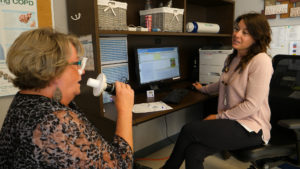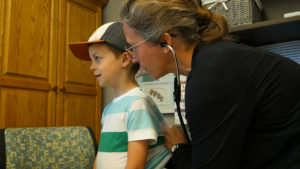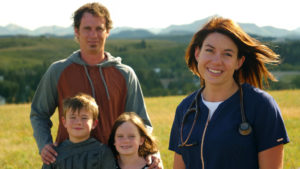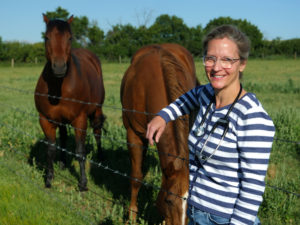It’s the start of another busy day in Pincher Creek for respiratory therapists Tess Craig and Larissa Lewis. Like most days, they begin by calibrating the spirometer, an instrument used to measure the air capacity in a patient’s lungs.
Together, these respiratory therapists, or RTs as they are also called, are making a huge difference in the lives of those who come to see them. Take Annie Steward, for example; she used to sing in a band until breathing problems brought that to an end.
“I used to never be able to even go for a short walk,” says Steward. “I’d be so short of breath.”

With proper medications and techniques used under the guidance of Craig, Annie is making significant progress.
“If I can get her to the right place to make her to be able to sing, and to enjoy that again, [that’s the goal],” says Craig.
“I’d like to be able to get up and sing a song sometime,” adds Steward. “Now, I have hope for that, and that’s because of Tess.”
Dr. John Rottger has worked with both of the respiratory therapists for years at the Pincher Creek Health Centre. He explains why they are so valuable to patient care.
“Physicians, in general, don’t have a great deal of time to spend with patients,” Dr. Rottger explains. “The addition of respiratory therapy here [at Pincher Creek Health Centre], particularly these two individuals, who have been stellar in what they’ve done, has made a huge difference to these patients.”
“They’ve got time to explain and review… [the patient’s] understanding of their disease and the approaches they should take.”
I suffer from asthma. Those two have saved my life. – John Taylor, patient
“Without them, I’d be buggered,” declares patient Allan Bowersock with a grin. “It’s very good care.”
“I suffer from asthma,” says John Taylor, patient and member of the Pincher Creek Attraction & Retention Committee for Rural Health Professions. “Those two have saved my life.”
As Larissa Lewis explains, when you work in a small community, you are not only treating patients, you are treating neighbours and friends.
“It’s very satisfying, because we can do our best to help the people that we live with,” Lewis adds.
In the cities, the primary job function for RTs is to run ventilators in intensive care units. In rural areas, they often have a much broader scope of practice.
“We sort of have to spread out our skills and I enjoy that,” says Lewis.

Larissa and Tess see both in– and out-patients who suffer with all kinds of respiratory disease.
“Not only do they provide comprehensive care for our patients in the clinic in terms of asthma and COPD (Chronic Obstructive Pulmonary Disease) management, they’re invaluable in the emergency room,” says Dr. Gavin Parker, physician at both the Pincher Creek Health Centre and the adjoining The Associate Clinic.
“In fact, we had a case last week, a little three-year-old kid, camping with quite a severe asthma attack. And they were Johnny-on-the-spot and really helped that kid through.”
Sometimes, people come in and say they’ve quit smoking or you’ve been able to manage their asthma, and you just want to have a cup of tea and throw a party. – Larissa Lewis
Madi Breckenridge is an RN at the Pincher Creek Health Centre who often works with both respiratory therapists.
“They do an amazing job,” she says. “They will come in in the middle of the night if we need them.”
“If I’m delivering a baby and that baby isn’t doing super well, they’ll come in any time we call them.
Jeff Brockman is the Executive Director of The Associate Clinic. He has a son who previously suffered breathing difficulties and was treated by Craig and Lewis.
“Where else are you able to you text a professional at 10 o’clock at night, because your kid is coughing his brains out and you’re worried as a parent?” Brockman asks.
“They work so well with everyone, side by side,” adds Mattie Wright, licensed practical nurse in acute care at the Pincher Creek Health Centre. “They’re just amazing people. We’re just very lucky to have them here.”
I love a rural lifestyle – Tess Craig
The Pincher Creek RTs feel the love from their co-workers and community.
“I love my job as an RT, and I feel like everybody around me has created that for me,” says Craig while fighting back tears of appreciation.
“Sometimes, it’s a lot of celebrating,” says Lewis. “Sometimes, people come in and say they’ve quit smoking or you’ve been able to manage their asthma, and you just want to have a cup of tea and throw a party and celebrate with that person.”
Lewis adds, “I have the greatest work partner ever.”
The two not only work together, they are good friends too.
Each Friday, during weekly simulation exercises, they share their knowledge with other staff at the hospital and the clinic.
“They’ve got a lot of knowledge and they’ve taught me so much, especially coming straight out of school into the working environment,” says Breckenridge.
At an RhPAP–sponsored Skills Day in Pincher Creek, they introduced high school students to respiratory therapy by using pig lungs.
Both Craig and Lewis grew up in the Pincher Creek area and spend time doing fun things together, like biking.

“I love a rural lifestyle,” says Craig. “It just gives us the ability to have a little bit more down time to do things together, not as much time travelling in the car.”
Lewis feels the same adding, “We farm and ranch, and we had four children that enjoyed that lifestyle as well.”

Congratulations to Tess and Larissa, recipients of one of the 2019 RhPAP Rhapsody Health-care Heroes Awards.
“It’s an honour to win the award,” says Craig. “It was a very big surprise.”
“I feel like we’re just part of a big team and I feel more like this award was for the whole facility (Pincher Creek Health Centre and The Associate Clinic) and not just for us,” says Lewis.
